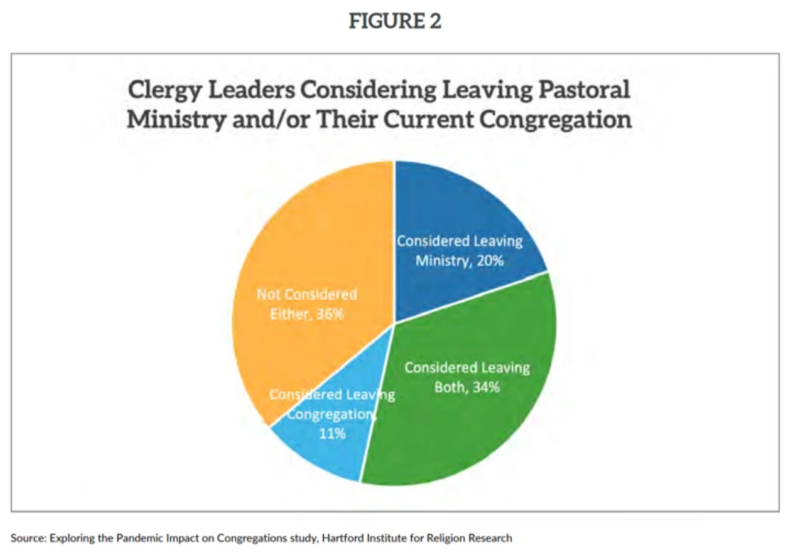
As American pastors have grown increasingly discontent with their profession, more than half have seriously considered leaving pastoral ministry since 2020 for various reasons, a new study from the Hartford Institute for Religion Research suggests.
In "I'm Exhausted All the Time — Exploring the Factors Contributing to Growing Clergy Discontentment," released Thursday as part of the institute's larger project "Exploring the Pandemic Impact on Congregations," researchers surveyed a nationally representative group of 1,700 religious leaders in the fall of 2023 then compared the findings to responses provided by clergy and their congregations in earlier EPIC surveys.
"The further we are from the onset of the COVID-19 pandemic, the more we observe larger percentages of clergy pondering alternatives to their present congregation, vocation, or both," the research team led by Scott Thumma, professor of Sociology of Religion at Hartford International University for Religion and Peace and director of the Hartford Institute for Religion Research, stated in the report.
The data suggests that as of fall 2023, 53% of religious leaders have seriously considered leaving pastoral ministry at least once since 2020. This share is significantly higher than the 37% of pastors who reported in 2021 that they had similar thoughts since 2020.
"While there is some overlap in these two thoughts, it is not entirely the same group of leaders considering leaving both their current congregation and the ministry profession altogether. About a third of leaders report having both thoughts, a third have considered one or the other (11% consider only leaving their congregation and 20% consider only leaving the profession) and the final third have never considered leaving either," researchers explained.
The growing discontent among pastors was described in the report as a "disconcerting" reality that implies "clergy are in the midst of a challenging time."
The average clergyperson was described as a 59-year-old leader who had served in their position for a median of 7 years and was 80% more likely to be white and male. Some 75% were employed full-time, and 60% of them served solo rather than as part of a team of leaders.
While most pastors reported taking a day off during the week, only a few have taken a sabbatical in the last decade. About a third held paid employment beyond their ministry work, and this was found to be more common among pastors who served part-time. Nevertheless, more than a quarter of full-time pastors reported additional employment.
In their efforts to explain the rising discontent among clergy, researchers examined questions of overall health and wellness among the leaders. They found that it did not appear that "a large percentage of clergy have suddenly become unwell or are suffering a dramatic emotional or spiritual disease and then thinking about leaving."
Researchers found that the changing religious landscape in America, sped up by the pandemic, has led to the challenging times that pastors now face, causing more of them to think of changing churches or leaving the profession altogether.
"The post-pandemic turnover has left our lay leadership depleted; people's sense of connection and commitment is less than before; it's hard to get people to do DIY church in the way that we did before; people seem to be more demanding of services. Plus — people's doubt is at an all-time high. I'm spiritually exhausted from talking people back into faith — am I even doing them a favor?" one pastor in the study reported.
Researchers pointed to the decadeslong decline in in-person attendance and church membership numbers.
"The current post-pandemic dynamics are being amplified as they act in consort with these long-evolving religious developments," Thumma and his team noted.
"Fewer people from younger generations now participate. Vitality measures are down, and greater numbers of attendees increasingly concentrate in the larger churches. Any post-pandemic rebound that happened did not rectify this situation, far from it. Less than half of congregations have recovered to or surpassed their pre-pandemic reality across several key measurements, such as attendance numbers or financial health," they explained.
"In the midst of this, following an uncommon burst of organizational elasticity that was essential to survive the pandemic, many congregations have curtailed their desire to change or continue to adapt to an ever-developing reality. Collectively, churches are now even less willing to change than they were just prior to the pandemic," the report added.
Though the median percentage of congregants who volunteer at their churches has rebounded since the pandemic, it is still lower than what it was before the pandemic, researchers said. In the early stages of the pandemic, regular church volunteers fell from 40% to 15%.
In 2023, that share got as high as 35%, as core attendees are now opting to attend services virtually, and a majority of congregations offer both virtual and hybrid opportunities to worship.
The disruption in business as usual and an unwillingness of churches to adapt has led to what researchers say is diminished morale, as 35% of churches now claim their future looks "uncertain."
"I am leaving the congregation in a few months. The leadership is moving backwards, and the congregation is only aging. [We are] getting some new folks, but [they are] all 60+ [years of age], and [the church has] lost most [of the] people under 60 since the pandemic. And the collapse of institutions like the church — all [these factors] are equally significant in me leaving," one pastor told researchers.
The data shows that pastors are more likely to want to leave their congregation when there is more conflict or if they don't have a good relationship with members. Other factors that sparked increased thoughts of leaving a congregation, though to a lesser degree include: an unwillingness of the congregation to change to meet new challenges, falling congregational vitality and diminishing attendances of 50 or fewer attendees.
For pastors thinking about leaving ministry altogether, researchers say the findings reflect a much more complex list of factors driving the shift.
"Unlike switching, where a few key factors accounted for much of the dynamic, increased thoughts of ministerial departure significantly relate to a good many different qualities of the clergy and their context. The combination of decreased attendance after the onset of the pandemic in addition to the long-term dynamics noted above such as decline and aging, conflict and a lack of new people all have demoralized many religious leaders in challenging contexts," they noted.
One pastor compared his struggles to Moses' experience during the Exodus journey when the Israelites complained constantly about their diet of manna, demanding meat, like when they were in Egypt.
"The number of older people who are projecting onto me their unprocessed grief at all the changes they have experienced … they complain constantly," the pastor is quoted as saying. "No matter what I do, someone will be unhappy. I very much relate to Numbers 11."

The study notes that demographic factors such as age, sex and race also factored into how pastors frequently think about quitting ministry.
"When clergy ages were sorted into generational clusters, an interesting age pattern did emerge. Pastors in the Baby Boomer (born 1946-1964) and Millennial (born 1981-1996) generations were much more likely to think frequently of quitting ministry. This makes sense for Baby Boomers who are nearing retirement and perhaps for Millennials who may be reconsidering their vocational choice while still relatively early in their career," researchers explained.
"Pastors in Generation X (born 1965-1980), however, thought less often of leaving perhaps due to having less freedom to change vocations and those Silent Generation (born 1928-1945) clergy who chose not to think of quitting ministry were almost certainly serving in the midst of their retirement," they added.
Black pastors were found to be slightly more likely to switch congregations than pastors of other races, while female pastors were slightly more likely to have thoughts of leaving ministry altogether because they tended to be serving in worse congregational contexts.
Pastors who served full-time and those who did not have a team were also found to be more likely to harbor thoughts of quitting ministry altogether.
"Being a part of a staff of ministers usually implies employment in a larger church. Indeed, size is strongly correlated with ministerial discontent. The larger the church, the fewer thoughts of leaving the pastoral ministry one has," the study reads.
"Therefore, a pastor is less likely to consider leaving the ministry in a larger congregation — a position possibly with a better salary, a built-in network of relationships, a distributed workload, and the support of additional staff. Conversely, being in a congregation between 51 and 250 worship attendees most highly relates to increased thoughts of leaving the ministry. These placements are most likely to be solo positions and be full-time status but have the least support and resources."
Researchers also found that the denomination a pastor belongs to also affects how likely they were to have thoughts about leaving the ministry.
"Catholic and Orthodox priests were least likely to entertain such thoughts while Mainline Protestant clergy were the most likely," they said. "Even though a large percentage of Evangelical clergy also ponder leaving the ministry, proportionately fewer of them do so in comparison to their Mainline Protestant peers."
Originally published by The Christian Post





